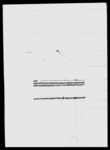A reply from Guru Prasāda Śāha and Raṇaśera Śāha acknowledging receipt of an unidentified letter (VS 1890)
ID: DNA_0001_0037
Edited and
translated by Rajan Khatiwoda
in collaboration with
Manik Bajracharya and Astrid Zotter
Created: 2014-12-24;
Last modified: 2020-04-02
For the metadata of the document, click here
The accompanying edition, translation/synopsis and/or commentary are available under the terms of the Creative Commons Attribution-ShareAlike 4.0 International License
Abstract
This document is a short acknowledgement from Guru Prasāda Śāha and Raṇaśera Śāha of an unidentified letter dated Tuesday, the 13th of the bright fortnight of Mārga in VS 1890.Diplomatic edition
[1r]
श्रीः\⟪नं.३७1 ⟫1अर्जि¯ ¯ ¯ ¯ ¯ ¯ ¯ ¯ ¯ ¯ ¯ ¯ ¯ ¯ ¯ ¯ ¯ ¯ ¯ ¯ ¯ ¯ ¯ ¯2उप्रान्त•मार्गशुदि१३रोज३मामेहेरमानिभयाकोकृपापत्रपौषवदि५रोज३कादिनआइ
3पूग्योहरफ्हरफ्पढिसिरचढाञाँइतिसम्वत्१८९०सालमितिपौषशुदि२रोज७शुभम्¯¯¯¯
1गुरुप्रसादसाहरणशेरसाहकोकोटिकोटिसाष्टांगदंडवत्सलामशलामसलामशुभं¯
Translation
No. 37
Arjī---
Uprānta: The letter with [expressions of] favour kindly sent [by you] on Tuesday, the 13th of the bright fortnight of Mārga arrived [here] on Saturday, the 2nd of the dark fortnight of Pauṣa. [We] read it line by line and bowed down [our] heads [to your feet].
Saturday, the 2nd of the bright fortnight of Pauṣa in the [Vikrama] era year 1890 (1834 CE).2 Auspiciousness.
Crores and crores of salutations in eight-limbed prostration (sāṣṭāṅgadaṇḍavat) from Guru Prasāda Śāha [and] Raṇaśera Śāha.
Commentary
The document is a reply from two sons of Prāṇa Śāha,3 Cautariyā Guru Prasāda Śāha and Kājī Raṇaśera Śāha, to an as yet unidentified letter. Guru Prasāda was appointed as one of the members of the Bhārādārī Kausala in 1840, which was headed by Prime Minister Phattya Jaṅga Śāha, and later, after the Kot massacre, kept under house arrest. The enmity between Prime Minister Jaṅga Bāhadura and Guru Prasāda ended after the former restored to the latter all his confiscated property and appointed him as a colonel in the army (see Regmi et al. 1981: 62-63). Raṇaśera Śāhā, the fourth and youngest brother of Guru Prasāda (see Regmi et al. 1981: 158) is mentioned as one of the witnesses to the promulgation of the Mulukī Ain of 1854 (see, MA-KM p. 3).

